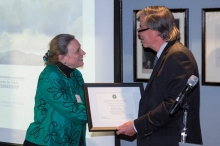You are here
New Harvard Conservation Award to Inspire Future Action

The Harvard Forest recently joined Harvard Kennedy School's Environmental and Natural Resources Program and Center for Public Leadership, along with the Lincoln Institute of Land Policy, to present the inaugural Charles H.W. Foster Award for Exemplary Academic Leadership in Land Conservation to Middlebury College. The President of Middlebury College, Laurie Patton (Harvard College '83), was present to accept the award.
"New England is a place where conservation precedents are set which impact the rest of the world," said Jim Levitt, Director of the Harvard Forest Program on Conservation Innovation, who convened the ceremony on behalf of ALPINE (Academics for Land Protection in New England) – a land conservation network based at the Harvard Forest. "It is a huge honor for us to be able to recognize the achievement of Middlebury College in showing the way for academic institutions to participate in the land conservation enterprise."
The award, this year honoring Middlebury for its conservation of the 2,100-acre Bread Loaf campus in Vermont, was presented in honor of Charles H.W. Foster, the distinguished conservation leader and beloved lecturer at Harvard Kennedy School's Environment and Natural Resources Program, who passed away in 2012. Dr. Foster was a key player in the establishment of both the Cape Cod National Seashore and the Silvio O. Conte National Wildlife Refuge, as well as a great many other local and regional initiatives.
At the award ceremony, Henry Lee, Director of the Belfer Center for Science & International Affairs at Harvard Kennedy School, said of Foster: "What we celebrate today is the legacy of a great mind, and the notion that the goals that he fought for will not be forgotten."
David Foster, Director of the Harvard Forest, followed these remarks by noting the important role that academic institutions and their diverse constituencies – students, administrators, and alumni – can play in conservation and environmental stewardship.
In her remarks, Laurie Patton, President of Middlebury, described some of the reasons Middlebury chose to protect its 2,100-acre Bread Loaf campus: "We have preserved this land for education, for recreation, and for conservation. We love [Bread Loaf] because it embodies the heart and soul of learning in a setting that challenges us and inspires us."
Patton accepted the award with gratitude for those who made it possible, including former Middlebury President Ron Liebowitz, also in attendance – and Louis Bacon, a Middlebury alumnus whose generous matching gift through his private foundation helped conserve the Bread Loaf campus. Bacon has also underwritten the Louis Bacon Environmental Fellows Program, launched fall 2015 and housed at Harvard Kennedy School's Center for Public Leadership, where he is a member of the Center's Leadership Council.
Middlebury has long been a leader in environmental education and bold sustainability action. They were the first in the U.S. to create an Environmental Studies major, and are now poised to become a carbon-neutral campus. Patton described the Bread Loaf project's role in this legacy: "This Bread Loaf conservation project has allowed us to again contribute to the public and environmental good, and to advance our environmental ethos while also being fiscally responsible." She noted that conservation often means protecting the healthy interaction between natural environments and the built environment.
Patton closed her remarks with a poem by Robert Frost, who was closely involved in Bread Loaf's early years. The poem described trees in a landscape that grows "wiser and older" and "means to stay". Patton concluded, "We are delighted to partner with Harvard and all the other institutions of higher education to make this 'older and wiser' conservation wisdom a reality."
Nan Jenks-Jay, Middlebury's Dean of Environmental Affairs, closed the ceremony by saying, "This is such a special moment, one that I imagine will be repeated many times over as other colleges and universities follow Middlebury's lead."
- Browse photos from the event, by Tom Fitzsimmons.

